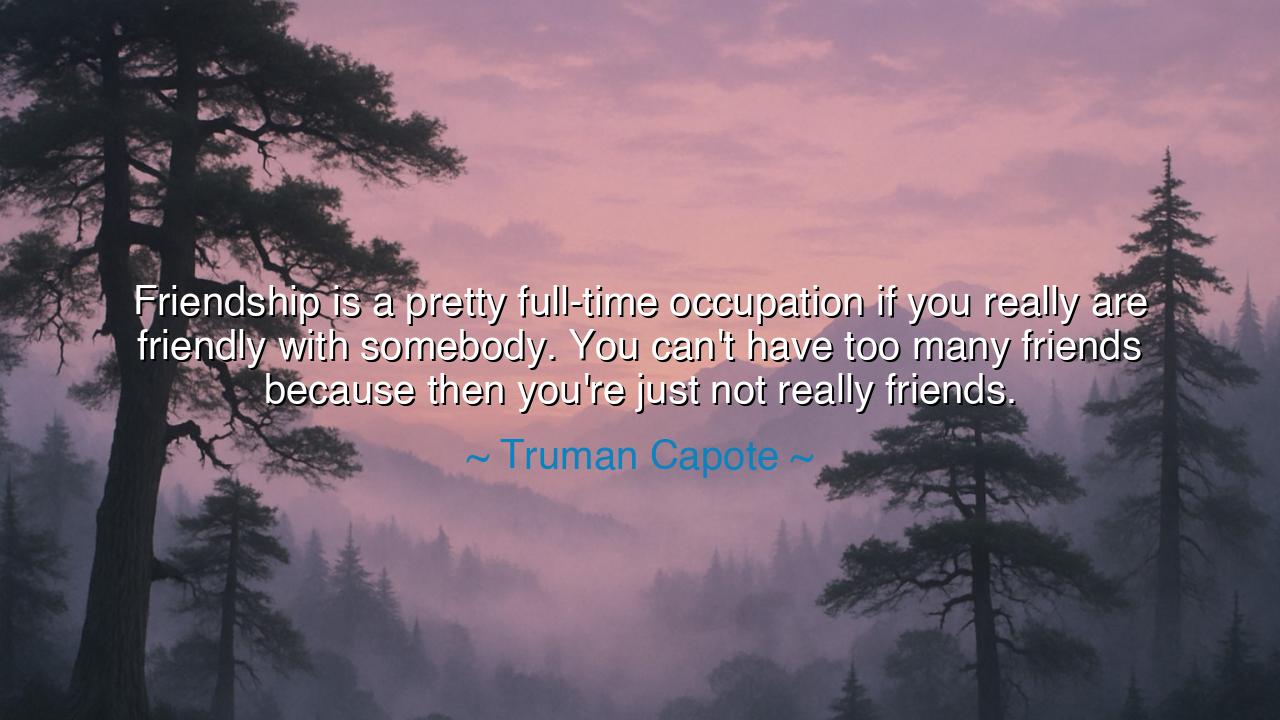
Friendship is a pretty full-time occupation if you really are
Friendship is a pretty full-time occupation if you really are friendly with somebody. You can't have too many friends because then you're just not really friends.






“Friendship is a pretty full-time occupation if you really are friendly with somebody. You can’t have too many friends because then you’re just not really friends.” Thus spoke Truman Capote, the keen observer of the human heart, whose words—like his stories—cut through illusion and reveal truth in its purest form. In this reflection, Capote speaks of friendship not as a casual pastime, but as a sacred duty, a living bond that demands time, presence, and care. His voice, at once tender and severe, reminds us that to be truly friendly is to give oneself wholly, and that the gift of attention, given to too many, soon loses its depth and meaning.
The origin of this quote emerges from Capote’s own complex life, marked by brilliance and solitude. He was a man surrounded by acquaintances and admirers, yet he knew the hollowness of crowds and the rarity of true connection. Having tasted both the sweetness of companionship and the bitterness of betrayal, Capote understood that friendship, if it is to be genuine, cannot be divided endlessly. Just as one cannot serve many masters, one cannot love deeply while scattering one’s affection thinly across too many hearts. Thus, he speaks as one who learned through experience that friendship, like art, demands devotion, discipline, and the courage to choose a few and love them well.
To call friendship a “full-time occupation” is to affirm that it requires labor—gentle but steadfast labor of the spirit. It means showing up not only in times of joy but also in hours of despair. It means listening without judgment, forgiving without hesitation, and celebrating without envy. It means being loyal when the world turns away. These acts, though quiet, are heavy with effort; they require patience, understanding, and selflessness. Hence Capote warns that the one who claims too many friends risks offering only a shadow of friendship—a smile without depth, a presence without warmth. True friendship, like the tending of a sacred flame, demands constancy.
The ancients knew this truth well. The philosopher Aristotle taught that while there are friendships of pleasure and utility, the highest form—the friendship of virtue—is rare, and can only exist between a few. For such a friendship is not based on what one gains, but on what one gives. It grows not from convenience, but from shared goodness and understanding. Even the great Cicero, who wrote so eloquently on amicitia, confessed that few men are blessed with more than one or two true friends in a lifetime. Thus, Capote stands in a long lineage of thinkers who saw friendship not as abundance, but as quality—not in number, but in depth.
Consider the example of Helen Keller and Anne Sullivan—a friendship that changed the course of history. When the young, blind, and deaf Helen met Anne, she met not only a teacher but a soul who would dedicate her entire life to her. Their friendship was a full-time devotion: Anne gave her strength, her mind, her patience, her love. For decades, they stood together through triumph and exhaustion. Anne did not have many friends—she had Helen. And through that one sacred friendship, she fulfilled her purpose. In their story, Capote’s words come alive: to be truly friendly is to give your whole heart, not a fraction of it.
Capote’s wisdom also bears a warning for our own age—a time when friendship is too easily multiplied and too rarely cultivated. We call many “friends,” yet know few deeply. We fill our lives with connections but leave our hearts untouched. We measure friendship by messages sent, not moments shared. But Capote reminds us that friendship is presence—the kind that demands time, vulnerability, and sacrifice. To maintain many is easy; to truly know and be known by a few is the greater, harder calling.
So let us take this teaching to heart: choose your friends not in haste, but in sincerity. Do not seek quantity, but quality—for one true friend who walks beside you in darkness is worth more than a hundred who smile only in light. Tend your friendships like living things: with attention, patience, and truth. Be willing to give your time, your compassion, your honesty, and your silence. And when you find a friendship that nourishes your soul, guard it as you would a treasure beyond price.
For in the end, as Truman Capote knew, friendship is not a collection but a communion—a sacred bond between souls who see each other clearly and still choose to stay. It is indeed a “full-time occupation,” for it asks not for fragments of the heart, but for its entirety. Let us, then, live as those who understand this truth: that the measure of a life well lived is not in how many names we know, but in how deeply we have loved, and how faithfully we have been friends.






AAdministratorAdministrator
Welcome, honored guests. Please leave a comment, we will respond soon